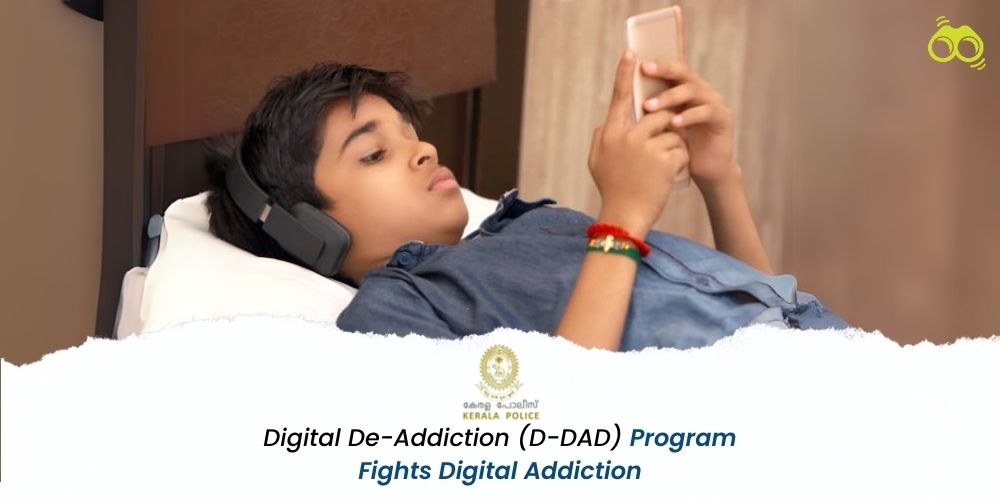Proactive Measures: Kerala’s D-DAD Programme Sets a Benchmark for Digital De-Addiction
Collaborative Effort: Kerala Police, Health, and Education Departments Join Forces Against Digital Addiction
Digital addiction among children is a growing concern in India, with studies indicating that a significant number of students are affected by excessive screen time, leading to various mental and physical health issues. To address this issue, the All India Institute of Medical Sciences (AIIMS) Delhi is set to open the country's first Centre for Advanced Research on Addictive Behaviours. This centre aims to develop evidence-based interventions for problematic technology use, emphasising the urgent need for school and family-level interventions to curb this trend.
Aligned with these efforts, the Kerala Police's Digital De-Addiction (D-DAD) programme has been reported as a major success in combating digital addiction among children. Since its launch in March 2023, the initiative has assisted 385 children in overcoming excessive mobile phone and internet use over 15 months. In total, 613 cases have been addressed through the programme, which operates in six districts: Thiruvananthapuram, Kollam, Thrissur, Kochi, Kozhikode, and Kannur.
The programme collaborates with the Departments of Health, Women and Child Development, and Education to provide free counselling and therapy to children up to 18 years old. Parents and teachers play a key role in identifying and supporting affected children in this endeavour. The D-DAD programme has effectively identified and helped children addicted to online games, social media, and pornography. For instance, in Kochi, 80 children were rehabilitated from smartphone addiction, and 210 students were diagnosed using addiction tests. The centres employ psychologists and police coordinators to assess addiction levels and provide therapy.
The programme's success is credited to its comprehensive approach, including awareness campaigns for parents and educators. ADGP Manoj Abraham plans to expand it statewide, recognising its success and the need for broader coverage. The goal is to protect children from harmful digital influences and promote healthier habits. Beyond rehabilitation, the programme educates families on responsible digital practices and promotes digital literacy and safety through schools and community groups. Parents have welcomed the initiative, with one sharing that it helped their child overcome gaming addiction and refocus on studies.
The D-DAD initiative was launched to address the growing digital addiction among children, which worsened due to increased internet use during the COVID-19 pandemic. Kerala, with its high internet penetration, has seen children engage in harmful online activities. The programme focuses on safer internet use by educating parents and children on responsible digital practices. Additionally, the Kerala Police has been proactive in tackling online crimes through operations like P-HUNT. The D-DAD programme takes a preventive approach, emphasising rehabilitation over punishment.
Overall, the D-DAD programme adopts a proactive and compassionate approach to digital addiction, fostering collaboration between law enforcement, healthcare, and education. It prioritises rehabilitation over punishment and sets a positive example for other states. As digital technologies evolve, society needs to ensure these advancements benefit, rather than harm, our children.
Editor's Note:
The digital age has brought many benefits but has also created serious challenges, especially for our children. Digital addiction is growing rapidly and poses significant risks to the mental and physical health of young people. The situation is alarming, and immediate action is needed. However, Kerala Police has taken important steps with their Digital De-Addiction (D-DAD) programme, which has already helped 385 children in just 15 months. This initiative is a shining example of how law enforcement, healthcare, and education can work together to tackle the issue. The programme has had a real, positive impact on families struggling with the effects of too much screen time. Similarly, the All India Institute of Medical Sciences (AIIMS) Delhi has launched the country's first Centre for Advanced Research on Addictive Behaviours. This centre will focus on creating evidence-based solutions and highlight the importance of taking action at both school and family levels. Other states should follow these examples and adopt similar programmes. The D-DAD initiative focuses on rehabilitation rather than punishment, offering a compassionate and effective approach. By expanding these efforts and promoting responsible digital habits, we can protect children from the dangers of digital addiction.
Skoobuzz firmly believes that as technology continues to grow, it's up to all of us to ensure that it benefits, rather than harms, our children. We must act now to prioritize their health and well-being. The future of our children depends on it.














0 Comments (Please Login To Continue)